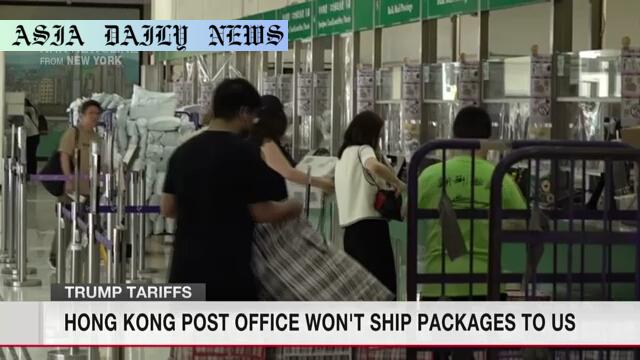Tariffs: Hong Kong halts package shipments to the US in response to new merchandise tariffs and removal of duty-free exemptions.

US Tariff Changes and Their Global Economic Impact
The recent announcement by Hong Kong Post to cease shipping packages to the US represents another ripple in the ongoing economic tensions between the two nations. These shipping restrictions follow the United States’ implementation of tariffs on Chinese and Hong Kong merchandise by removing the longstanding “de minimis” exemption. This exemption, which previously allowed shipments under $800 to bypass duty fees, has been pivotal for businesses relying on low-cost logistics, particularly e-commerce firms such as Shein and Temu.
Hong Kong officials have criticized the US government’s decisions, labeling them as “unreasonable” and “bullying.” This tension adds yet another layer to the strained relations between the nations. The cessation of shipping services for surface parcels and air mail packages by April 27th signifies a significant change for residents and businesses in Hong Kong reliant on affordable postal services for exports to American markets. The immediate implication includes a disruption for individuals like expatriates and small business owners, who previously relied on easy and inexpensive transcontinental shipping options.
Economic Fallout for Key Stakeholders
The removal of the “de minimis” provision has upended the operational models for Chinese-based retailers and manufacturing businesses. Companies like Temu and Shein, which had flourished by shipping affordable goods directly to US customers, are now facing steep operational challenges. One Guangzhou-based manufacturer reported that their order volume has decreased by 40%, citing the new tariffs as a primary cause. With profit margins already tight due to global supply chain issues, this additional economic obstacle is anticipated to have far-reaching effects on small-to-mid-sized enterprises in China.
Industry opposition has been swift, with numerous trade associations arguing that the policy harms both economic collaboration and consumer choice. For American consumers used to accessing inexpensive and trendy products from Chinese platforms, price increases and restricted availability are likely. Conversely, the policy is positioned to bolster American manufacturers who have long complained about the competitive disadvantage created by duty-free imports.
Broader Implications for Global Trade
The decision to remove the “de minimis” exemption is part of a broader move by the US to strategically restrict China’s economic influence—aligning with policies aimed at decoupling the two economic superpowers. Such measures not only draw lines between China and the US but also influence other global stakeholders reliant on US-China trade routes. Trade revenues, supply chain relationships, and even diplomatic dynamics are all impacted by such tariff policies.
Ultimately, the cessation of Hong Kong Post’s package deliveries to the US is a reactionary but symbolic decision. Beyond its immediate logistical implications, it reflects the broader, ongoing economic clash between the United States and China, with Hong Kong serving as a critical interface. As both sides continue to escalate their responses, businesses, consumers, and governments will need to adapt to the evolving trade dynamics.
Commentary
Escalating Tensions Between Two Economic Giants
The latest development surrounding Hong Kong’s decision to halt package shipments to the US shines a spotlight on the escalating trade war between major global powers. Such actions are not merely tactical—they are reflective of deep-seated frustrations stemming from economic policies that disproportionately affect smaller stakeholders like regional manufacturers, consumers, and small businesses. The cessation of shipping services emphasizes the human cost of these macroeconomic decisions, which disrupt livelihoods and reshape market landscapes.
The Implications for Cross-Border Commerce
Inclusions such as the “de minimis” exemption were once celebrated as enablers of globalization, fostering convenient commerce and expanded consumer markets. Its removal, combined with hefty tariffs, signifies a strategic pivot aimed at restraining economic dependencies on China. However, these policies also risk restricting American access to a diverse pool of affordable goods—particularly in an e-commerce age when consumer convenience reigns supreme. This raises the question: Is the gain in protecting domestic jobs worth the loss of consumer benefits?
Broader Realities and the Future
The ripple effects are undeniable, with real-time evidence shown in diminished manufacturing orders and a slowdown in global trade activities. As globalization faces increasing headwinds from policies like these, businesses, especially smaller ones, may be forced to rethink supply chain strategies and consumer engagement processes. Moving forward, collaboration—or continued contention—will dictate the direction of this narrative.


